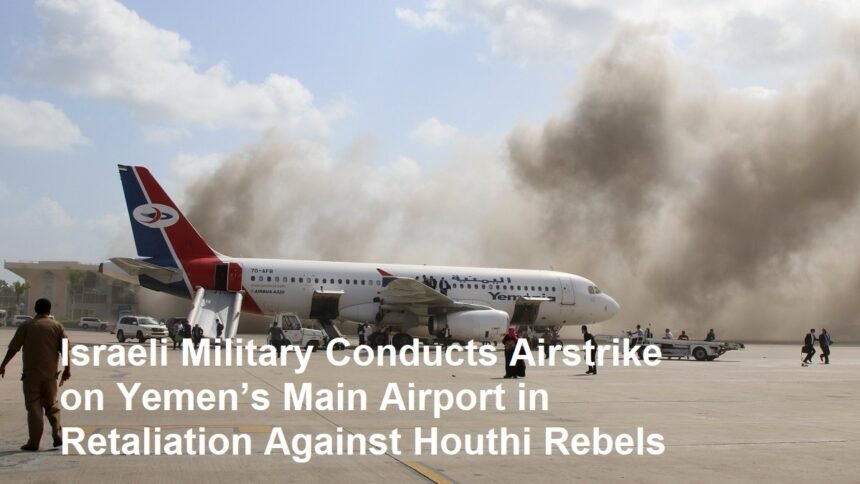On Tuesday, May 6, 2025, the Israeli military announced that it had carried out an airstrike targeting Yemen’s primary airport. This operation was described as a retaliatory measure in response to recent attacks by the Houthi rebel forces, who have been engaged in a prolonged conflict within Yemen and have extended their hostilities beyond their borders.
Background of the Conflict
The ongoing conflict in Yemen has involved multiple factions, with the Houthi rebels controlling significant portions of the country, including the capital, Sana’a. The Houthis have been engaged in a civil war against the internationally recognized Yemeni government, supported by a Saudi-led coalition. Over recent years, the conflict has drawn in regional and international actors, escalating into a complex proxy war.
The Houthis have launched missile and drone attacks targeting neighboring countries, including Saudi Arabia and, more recently, Israel. These attacks have heightened regional tensions and prompted military responses.
Details of the Israeli Airstrike
The Israeli military’s airstrike on Yemen’s main airport was a significant escalation in the conflict. The airport, a critical infrastructure hub, serves as a gateway for both civilian and military transport.
- Target and Timing:The strike occurred on May 6, 2025, focusing on disabling the airport’s operational capabilities to hinder the Houthis’ logistical and military movements.
- Retaliation Motive:Israeli officials stated that the airstrike was a direct response to recent attacks by Houthi forces, which included missile launches and drone incursions targeting Israeli territory.
- Military Objectives:By targeting the airport, Israel aimed to disrupt the Houthis’ supply chains and reduce their ability to project power beyond Yemen’s borders.
Regional and International Reactions
The airstrike has drawn varied reactions from regional and global actors:
- Yemen and Houthi Response:The Houthis condemned the Israeli attack, vowing to continue their resistance and retaliate against what they described as aggression.
- Saudi-led Coalition:While Saudi Arabia has been involved in Yemen’s conflict, its stance on the Israeli strike was cautious, emphasizing the need for de-escalation.
- International Community:Many countries expressed concern over the escalation, urging restraint from all parties to prevent further destabilization of the already fragile region.
Humanitarian Concerns
Yemen is already facing one of the world’s worst humanitarian crises due to years of conflict, famine, and disease outbreaks. The airstrike on the main airport raises serious concerns about worsening the situation:
- Impact on Civilians:The airport is vital for delivering humanitarian aid, medical supplies, and facilitating evacuations. Damage to this infrastructure could severely hamper relief efforts.
- Displacement and Casualties:Increased military actions risk further civilian casualties and displacement, exacerbating the humanitarian emergency.
Strategic Implications
The Israeli airstrike marks a notable expansion of the conflict’s geographic scope and highlights the growing regional dimensions of the Yemen war:
- Proxy Conflict Dynamics:The involvement of Israel against the Houthis, who are backed by Iran, underscores the proxy nature of the conflict, with regional powers vying for influence.
- Security Concerns:Israel’s direct military action signals its intent to counter threats from non-state actors beyond its immediate borders.
- Potential for Wider Conflict:The escalation risks drawing in additional regional actors, potentially destabilizing the Middle East further.
Conclusion
The Israeli military’s airstrike on Yemen’s main airport on May 6, 2025, represents a significant escalation in the ongoing conflict involving the Houthi rebels. As a retaliatory measure against attacks on Israeli territory, the strike underscores the complex and interconnected nature of Middle Eastern conflicts.
While Israel aims to neutralize threats and protect its security, the operation raises serious humanitarian and geopolitical concerns. The international community continues to call for dialogue, restraint, and efforts to resolve the conflict peacefully to prevent further suffering and instability in the region.









